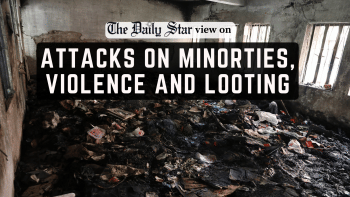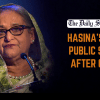Justice and equal rights are crucial for minorities

That there have been a number of attacks, including looting and arson, targeting the homes, businesses, and places of worship of minority communities after the fall of the Awami League government cannot be denied, nor should questions like who orchestrated the attacks or what political motives might be behind them be allowed to overshadow the importance of security, justice, and equal rights for these vulnerable groups. According to the chief of army staff, there were around 30 crimes against minority communities in 20 districts. The number provided by the Bangladesh Hindu Buddhist Christian Unity Council (BHBCUC) is much higher. Only a thorough and impartial investigation can clear up the confusion, and hopefully lead to justice, which is vitally needed.
In Bangladesh, minorities—religious or ethnic—are often among the first to suffer during political upheavals. Even during normal times, we have seen how dodgy political elements exploited their vulnerability. Many persecuted minority families also had to flee their homes and even leave the country. However, this time, their response has been markedly different. Members of minority communities chose to stand their ground and protest against the violence. The BHBCUC also presented an eight-point demand, vowing to continue their protests until the attacks ceased. Although the protests were later suspended following assurances from Chief Adviser Dr Muhammad Yunus, tensions still remain.
True, the sensitivities of the issue under the present circumstance made it something of a political minefield requiring caution, but we should be able to unequivocally denounce any attack on minorities and demand their protection from further assaults. We were heartened by the message given by Dr Yunus—that all people in Bangladesh are members of one family—and the solidarity of student protesters and ordinary citizens who guarded the homes and places of worship of minorities. This show of positivity and solidarity must continue. And the interim government must honour its commitment to provide security to all members of minority communities.
But since the minority question keeps surfacing under new realities, we should think critically about what we are doing wrong, and what we should do to address it. In the new Bangladesh that we hope to build, minorities must enjoy the same rights and protection as everyone else. Some of the demands forwarded by BHBCUC—including the introduction of a law to protect minority communities, full implementation of the CHT Peace Accord, and greater participation and representation of religious and ethnic minorities in government—deserve immediate consideration. Through these and other sociopolitical reforms, we must eradicate their vulnerability so that no vested groups can ever exploit them.


 For all latest news, follow The Daily Star's Google News channel.
For all latest news, follow The Daily Star's Google News channel. 










Comments